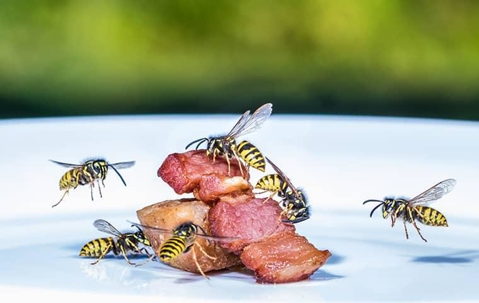At Parkway, we get lots of phone calls from people concerned about bees and wasps on their properties. You might be surprised that the majority of our phone calls from concerned home and business owners occur in the late summer/early fall. The reason for this is because although stinging insect colony growth starts to slow at this time, the foraging insects of the colony begin looking for sweeter sources of food, as the queen and the workers of the colony require greater amounts of sugar. They can become aggressive as they search for sweets and they may start infiltrating areas where they weren’t a concern before. This can mean your outdoor BBQ or picnic finds unwanted visitors in the form of yellow jackets, paper wasps, mud daubers, bumble bees and honey bees.
In the late summer and early fall, the queens are working overtime to produce eggs that will become the next generation of queen wasps and males. As soon as these eggs mature, they leave the nest to mate with stinging insects of other colonies, causing them to seem like even more of a problem than they were in the spring or early summer. The young queens that have mated with the males will normally not fly too far from the original nest, looking for a place nearby to hibernate for the winter so she can begin building her nest in the spring. In the coming weeks/months, you may begin to notice nests on your property and see more and more wasp activity near the area; although these insects can be beneficial at keeping other insect populations in check, they can become a problem for you when they become aggressive and start spending too much time around your home and your family.
If you’ve been one of the unlucky ones to find you’ve got a bees nest (or nest of another stinging insect) on your deck, under the eaves of your roof, in the soffits or even inside bushes or shrubs on property, you should know that taking care of the nest on your own can be a dangerous activity. Not only can DIY stinging insect control techniques be ineffective or even dangerous if mixed improperly or used incorrectly, the stinging insects themselves can become defensive, especially if they spy you going after their nest. A sting from a bee or a wasp can be very painful or can be deadly, depending on how your body reacts to stinging insect venom. Instead of putting yourself (or your family) in harm’s way, contact a pest control professional to deal with a stinging insect nest if it becomes a problem on your NY property.
For Long Island exterminators that you can trust to safely and efficiently get rid of stinging insect nests on your property, contact the professionals at Parkway Pest Services. A locally owned, 3rd generation Long Island pest control company, we have been in business since 1932 and are prepared to help you control wasps and bees on your property safely and quickly. Serving all of Long Island including Suffolk County and Nassau County, Parkway also offers stinging insect and pest control in Queens, Westchester County and throughout NY as well as Fairfield County, CT. When you contact us, mention our pest control coupon and save on stinging insect control!

